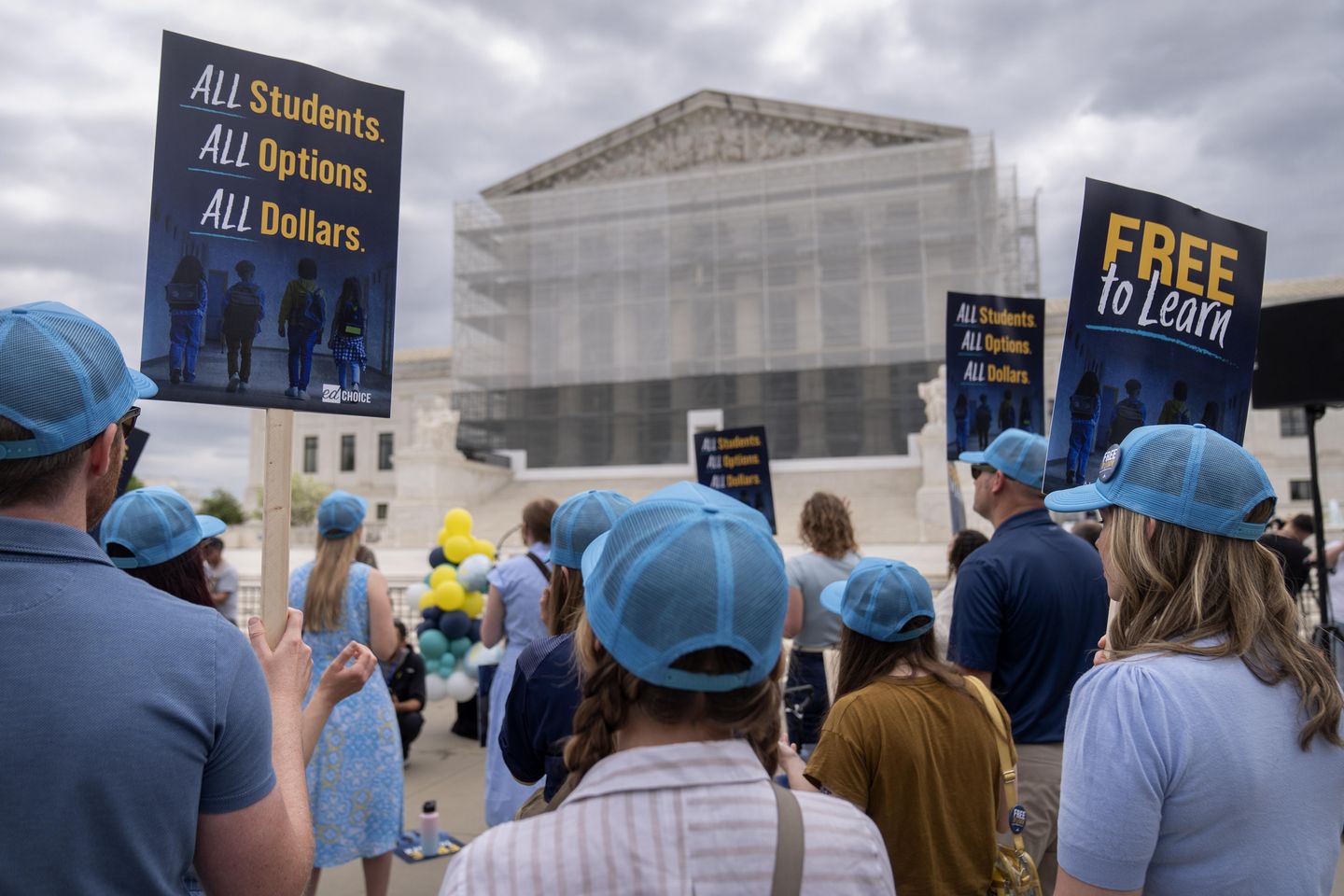
Supreme Court justices struggled Wednesday to decide whether Oklahoma can open the nation’s first religious charter school in a case that goes to the heart of whether charters are public or private institutions.
St. Isadore of Seville Catholic Virtual School plans to incorporate Catholic teachings into its curriculum. However, the state attorney general said this would create too much of an entanglement between the government and religion, violating the First Amendment’s prohibition on the establishment of religion.
That argument resonated with the Supreme Court’s Democratic appointees, who said charter schools operate primarily as arms of the state, so having one of them teach a devoutly religious curriculum would cross constitutional lines.
“Your school doesn’t just want to be a charter school; it wants to be a religious charter school,” said Justice Sonia Sotomayor, an Obama appointee.
Some of the court’s Republican appointees said that in a world where charter schools can be formed to focus on the environment, science, athletics or immersion in languages, it smacks of discrimination to say schools cannot adopt a religious curriculum.
“When you have a program that’s open to all comers except religion — ‘No, we can’t do that, we can do everything else’ — that seems like rank discrimination against religion,” said Justice Brett M. Kavanaugh, a Trump appointee to the court.
A series of rulings over the past decade focused on the First Amendment’s free exercise clause, which says the government cannot impinge on someone’s religious beliefs.
In a 2017 case, the justices said that meant a Missouri program to refurbish playgrounds couldn’t refuse applications from churches. In a 2020 case, the court said Philadelphia couldn’t refuse to do business with a Catholic-run adoption agency.
In a 2022 case, the high court said Maine couldn’t prevent state-funded tuition from going toward religious private schools.
Chief Justice John G. Roberts Jr. said St. Isadore’s situation may differ because the government has “much more comprehensive involvement” with a charter school.
He said the adoption agency case seemed to set the standard.
“We held they couldn’t engage in that discrimination,” the chief justice said. “How is that different than what we have here? We have an education program, and you want to not allow them to participate with a religious entity?”
Gregory G. Garre, representing the Oklahoma attorney general, said schooling is a core government obligation, which makes public schools different from adoption agencies.
“Charter schools are public schools,” Mr. Garre said. “Teaching religion in public schools is not allowed.”
The justices and the attorneys sparred over where to draw the line of what constitutes a public school.
Mr. Garre said Oklahoma maintains tight control over charters, including approving their curriculum and providing funding. The state can shut them down.
Justice Sotomayor said St. Isadore also requires students to attend Mass and teachers must adhere to the Catholic faith.
“What you’re saying is the free exercise clause trumps the essence of the establishment clause because the essence of the establishment clause is we’re not going to pay religious leaders to teach their religion,” Justice Sotomayor said.
James A. Campbell, representing the Oklahoma Statewide Charter School Board, said exceptions can be made for Mass attendance. Charter schools have independent boards that run operations under a contract with the state. He said teachers do not have to be Catholic.
“The state is not running these schools,” he said.
The Trump administration has sided with the school.
“They are not engaged in state action,” D. John Sauer, the U.S. solicitor general, told the court.
“Participation in charter schools is mediated by two layers of private choice,” said Mr. Sauer, adding that the school is created by private actors and parents who have the choice of where to enroll their children.
Charter schools, which are publicly funded but don’t operate as traditional neighborhood schools, have surged in popularity over the past three decades.
Parents consider charter schools as alternatives to their underperforming local options or a chance to give their children an education with a particular focus.
That makes Wednesday’s cases freighted with implications.
Mr. Garre said a ruling in favor of St. Isadore could upend charter schools in dozens of other states. Some states might shut down operations if it meant they would have to approve religious institutions.
Mr. Campbell said the charter schools are like any other contractor. If the government can refuse to do business with a contractor because of its religious connections, that could spill over to other contracts.
A state board approved St. Isadore’s application in 2023, but Oklahoma Attorney General Gentner Drummond took the case to the Oklahoma Supreme Court, which ruled against the school.
“This case is ultimately about safeguarding religious liberty,” Mr. Drummond said after Wednesday’s arguments. “Religious liberty means every citizen is free to worship as he or she sees fit. It does not mean the government should back religious indoctrination.”
Oklahoma’s two Catholic bishops said they “pray and hope for a decision that stands with religious liberty.”
Oklahoma has 33 charter schools, seven of which are virtual schools. They include language immersion schools, STEM schools and American Indian culture schools.
Although Oklahoma has no single-sex charter schools, other jurisdictions have approved them.
The cases — Oklahoma Statewide Charter School Board v. Drummond and St. Isidore of Seville Catholic Virtual School v. Drummond — were consolidated for arguments.
A decision is expected by the end of June.
Justice Amy Coney Barrett has been recused from the case. She did not give a reason, but court watchers suspect it was because of her connection to one of the people defending the school’s opening.
That leaves eight remaining justices. A 4-4 split would affirm the Oklahoma Supreme Court’s decision against the charter school.














